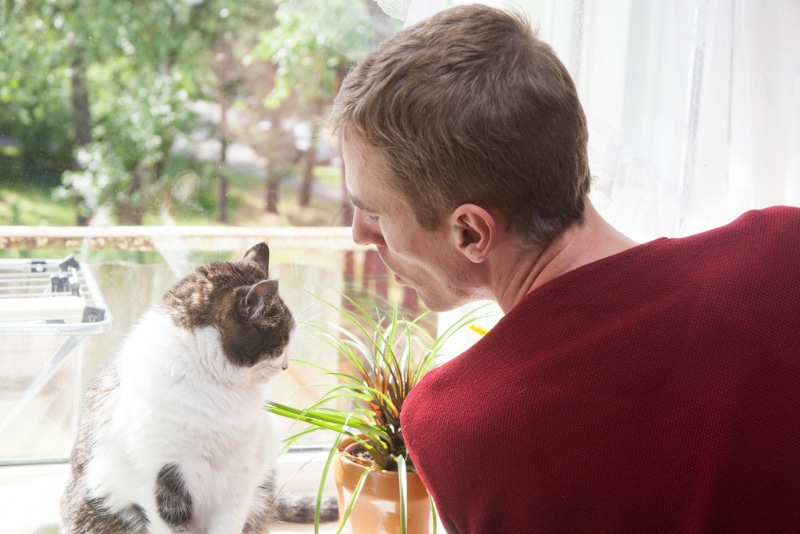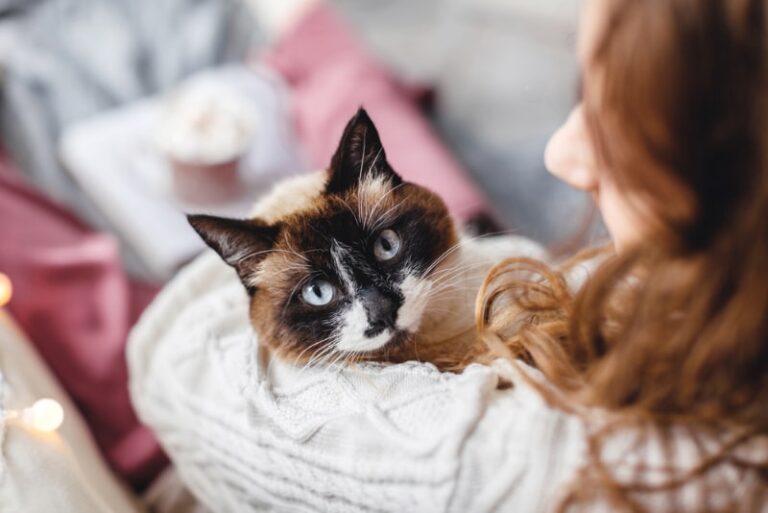Even the shyest amongst us can really feel assured belting out our favourite tunes within the consolation of dwelling, and it’s even higher when our cats are there to pay attention. As an ideal viewers for our shameless rehearsals, cats pay attention on with judgment-free pleasure. However do cats genuinely take pleasure in our singing, or are they simply being well mannered? We’ll discover the science and indicators of whether or not cats like our singing and the sorts of music they’re extra prone to want.
Do Cats Like When You Sing to Them?
Though there’s no scientific research on whether or not cats take pleasure in our singing, a number of house owners swear their cats perk up after they begin crooning. Many discover their cats turn into extra affectionate, looking for them out for cuddles and kisses. Some even really feel their pets have favourite songs and sometimes go to nice lengths to put in writing authentic tunes for them!

Is It Our Singing?
Regardless of the anecdotal proof, we nonetheless can’t make sure cats act this manner as a result of they like our singing. Are they reacting to the sound of our voice, or is one thing else occurring whereas we sing?
Cats use each environmental component alongside earlier expertise to inspire them. Possibly you give your cat treats, play time, or further affection whenever you sing to them. Your singing might not make them come operating however reasonably their information that one thing good is coming their manner.
Cats additionally perceive human emotion. Resulting from diversifications from domestication, cats can react in keeping with the emotional indicators house owners give off. They’ll seek for escape when their proprietor acts fearful and search closeness and a spotlight after they’re pleased. And who isn’t upbeat after they’re singing? Quite than responding to your music, your cat may react to your good temper.
Then there’s the query of whether or not cats even like music. We assume they benefit from the sound primarily based on their actions, however they don’t present any definitive suggestions. Happily, scientists have answered a few of these questions, and because it seems, cats like music fairly a bit! It’s simply not what any of us may count on.
What Music Do Cats Like?
A number of research have fine-tuned our understanding of feline preferences and music’s emotional and physiological results. Researchers investigated how completely different music genres affected a cat’s autonomic nervous system below anesthesia1.
Evaluating pop, heavy metallic, and classical music, they discovered cats differentiate rhythms and that the sounds affected ANS controls like respiration and pupil dilation. Classical music was related to decrease stress and extra rest, and heavy metallic to increased stress and anxiousness.
An earlier research from 2015 seemed on the results of cat-specific music to see if cats would reply extra to it than to music made for people. The idea was that, like people and lots of different animals, cats would favor music that mirrored their species-specific frequency vary, tempo, and different communication components2.
As anticipated, cats had been considerably extra interested by their model, with older and youthful cats displaying the very best response. One other 2019 research checked out cat-specific music’s results in worrying medical settings3.
Cats listened to 10-minute samples of both classical music, cat music, or silence earlier than an examination on the vet. Though classical music and silence had little impact, the cat-specific music led to lowered stress and extra openness to dealing with.

What Is Cat Music?
With cat-specific music considerably impacting pets, you’re possible questioning what it feels like. The music focuses on tones acquainted to cats, utilizing tempos and better octaves that match their pure communication patterns.
Within the 2015 research on cat-specific music, researchers hypothesized that sure musical qualities that have an effect on people can have an effect on different animals. They added components like longer notes to be extra calming and common rhythms to induce optimistic states.
The researchers additionally layered in purring, suckling, and different rewarding sounds in feline vocalizations. Such noises are typical throughout nursing, which is a vital interval of emotional growth for cats. The expectation was that the acquainted sounds would evoke comforting emotions and a optimistic response from the cats.
The result’s a set of soothing, drawn-out, and sometimes high-pitched tones. Violins, xylophones, pianos, and different classical devices fill a lot of the ambient music whereas the low rumbling of a purring or suckling cat performs repeatedly within the background.
What Ought to You Sing to Your Cat?
Contemplating their common tastes, you possibly can experiment with these affiliative vocalizations in your singing. It’d take follow, however you possibly can attempt integrating the low rumbling sounds of purring or the calming legato tones typical of cat music. Take a look at completely different combos to see if any have a better effect than others.
You can even cheat a bit of by singing your cat’s title. It is perhaps simpler (and extra enjoyable) to seek out artistic methods to mix their title into high 40 hits than to belt out authentic cat music, and their response to it could be the identical. Cats can discriminate their title amongst others. In the event that they affiliate listening to their title with a reward like treats or playtime, they might come operating whenever you sing a tribute to them.


Ultimate Ideas
Possibly your cat loves your singing, or maybe they’re displaying curiosity as a result of they know you’re pleased. They received’t inform us for certain, however in the long run, does it even matter? Your tunes have a optimistic which means to your pets and make you cheerful within the meantime. No matter your cat’s motivation, there’s no purpose to carry again whenever you’re feeling a song in your heart.
Featured Picture Credit score: Gladskikh Tatiana, Shutterstock

